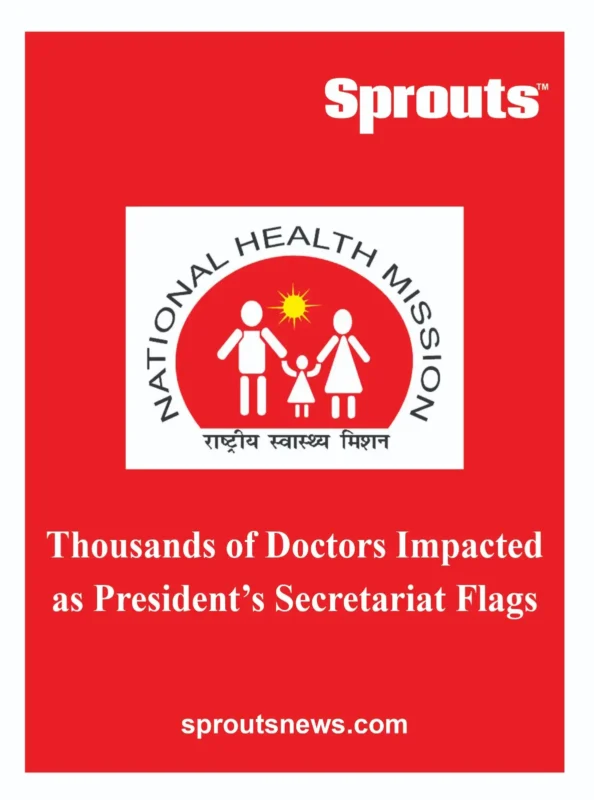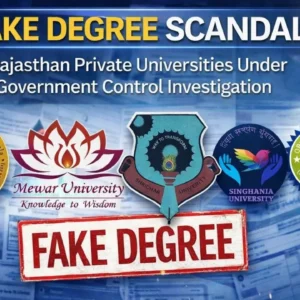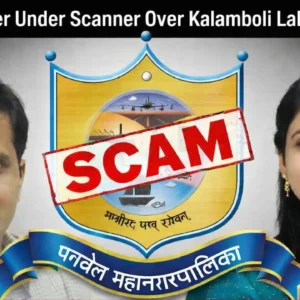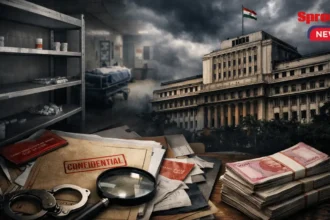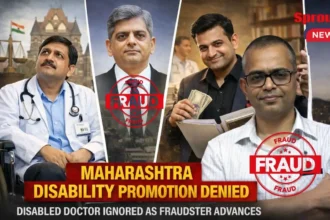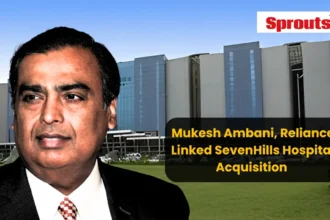Thousands of Doctors Impacted as President’s Secretariat Flags
• Constitutional and Rural Health Concerns Raised
• Rashtrapati Bhavan Directs High-Level Scrutiny on Health Ministry
• Legal Experts Decry NHM Policy as Violation of Equality Rights
Unmesh Gujarathi
Sprouts News Exclusive
Contact: +91 9322755098
- Thousands of Doctors Impacted as President’s Secretariat Flags
- • Constitutional and Rural Health Concerns Raised
- • Rashtrapati Bhavan Directs High-Level Scrutiny on Health Ministry
- • Legal Experts Decry NHM Policy as Violation of Equality Rights
- President’s Secretariat Intervenes in NHM Madhya Pradesh Recruitment Policy, Flags Constitutional Violations
- Rashtrapati Bhavan Directs Accountability Chain on Health Policy
- Understanding NHM MP’s Exclusionary Recruitment Rules
- Constitutional and Legal Challenges to the NHM Policy
- Public Health Crisis in Rural and Tribal Districts
- Political Repercussions and National Implications
- Demands for Systemic NHM Recruitment Reforms
- The Road Ahead for Healthcare Governance
The President’s Secretariat has intervened in NHM Madhya Pradesh’s recruitment, challenging its exclusion of non-bonded General Surgery posts. This rare move, escalating through top health officials, cites constitutional violations and a crippling public health impact on rural surgical care, placing the controversial policy under intense scrutiny.
President’s Secretariat Intervenes in NHM Madhya Pradesh Recruitment Policy, Flags Constitutional Violations
In an unprecedented move, the President’s Secretariat has formally escalated a grievance concerning the National Health Mission (NHM) Madhya Pradesh’s controversial recruitment policy. The policy excludes MS General Surgery specialists from non-bonded recruitment, a decision now under intense constitutional scrutiny. This intervention, routed through India’s highest health authorities, raises a critical question: will this exclusion be overturned, or will rural India continue to be deprived of essential surgical care?
Click Here To Download the News Attachment
Rashtrapati Bhavan Directs Accountability Chain on Health Policy
According to exclusive documents accessed by the Sprouts News Special Investigation Team (SIT), the grievance has been systematically routed through the top echelons of India’s health governance. The escalation pathway includes the Union Health Minister, Health Secretary, Additional Secretary (NHM), Joint Secretary (NHM), Director NHM, and finally, the responsible Under Secretary.
This direct chain of command initiated from Rashtrapati Bhavan is highly exceptional. It signals acute urgency and frames NHM Madhya Pradesh’s recruitment rules as a significant constitutional concern, marking a rare direct intervention in state-level health policy.
Understanding NHM MP’s Exclusionary Recruitment Rules
The core of the controversy lies in NHM MP’s selective admission of specialities for non-bonded recruitment. Specialties like Anesthesia, Pediatrics, Radiology, and Obstetrics & Gynecology are permitted, while MS General Surgery is singularly excluded without any official justification. This discriminatory policy has been implemented silently, bypassing standard procedural transparency. The Sprouts News SIT investigation revealed that this omission appears deliberate, creating an artificial shortage that potentially benefits the bonded recruitment system.
Constitutional and Legal Challenges to the NHM Policy
Legal experts consulted by the Sprouts News Special Investigation Team assert the policy is vulnerable to judicial review on multiple constitutional grounds. Primary violations include Article 14 (right to equality, as the exclusion is arbitrary and lacks a rational basis), Article 16(1) (denial of equal opportunity in public employment), and Article 19(1)(g) (unreasonable restriction on the right to practice any profession). The policy’s indefensible nature makes it legally unsustainable, and a petition in the High Court is considered highly likely to succeed if bureaucratic resolution fails.
Public Health Crisis in Rural and Tribal Districts
The human cost of this policy is severe and measurable. Rural and tribal districts bear the brunt, with surgical posts remaining vacant and operation theatres rendered non-functional. First Referral Units (FRUs), which are critical for handling emergencies like C-sections and trauma care, are crippled without surgical capabilities. This directly leads to increased patient mortality from treatable conditions and forces costly, life-threatening referrals to distant urban centers, disproportionately impacting impoverished families.
Political Repercussions and National Implications
The political stakes are considerable. The ongoing neglect of tribal health infrastructure in Madhya Pradesh is a sensitive issue, and this policy directly exacerbates the problem. Despite presidential scrutiny, the Health Ministry’s delayed response risks escalating the matter to Parliament, potentially through a Calling Attention Motion. This would amplify public debate and place the ruling administration under greater liability for failing to rectify a policy that contradicts the NHM’s core mandate of strengthening rural healthcare.
Also Read: Ostwal Builders Director Arrested in Fake Permit Fraud at Mira Road.
Demands for Systemic NHM Recruitment Reforms
Petitioners and health advocacy groups are leveraging this moment to demand comprehensive reforms within NHM recruitment nationwide. Key recommendations include establishing uniform national guidelines to prevent arbitrary exclusion of specialities, mandating written clarifications for any recruitment deviations, and implementing a fully transparent, merit-based framework that aligns with actual public healthcare needs rather than opaque administrative decisions.
The Road Ahead for Healthcare Governance
The immediate decision now rests with the responsible Under Secretary. The choices are to overturn the discriminatory policy, provide a long-overdue justification that can withstand constitutional muster, or risk the institutional credibility of the NHM and the Health Ministry by allowing the exclusion to persist. An overturn would immediately open doors for qualified surgeons to serve in rural hospitals, saving countless lives. Inaction, however, will inevitably trigger legal battles and broader scrutiny of India’s healthcare governance, setting a critical precedent for bureaucratic accountability in public health.




